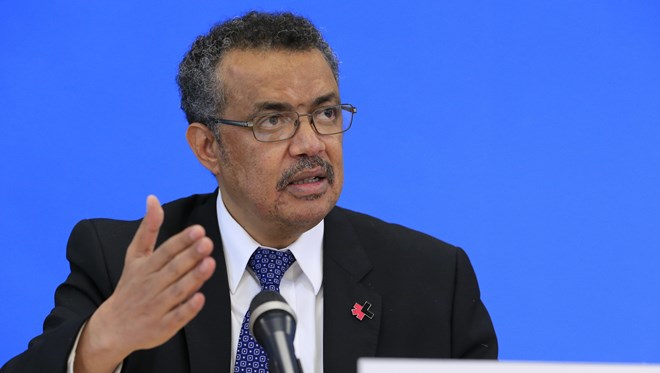Thursday May 18, 2017
By Abdi Latif Dahir

Under scrutiny. (Reuters/Pierre Albouy)
On May 22, member states of the World Health Organization will converge in Geneva to elect a new director-general to lead the 8,000-person global health agency. Among the three final candidates vying for the top job, one is now accused of covering up previous epidemics.
Dr. Tedros Adhanom Ghebreyesus, a malaria expert and Ethiopia’s health minister from 2005 to 2012, is being blamed for allegedly covering up cholera epidemics in 2006, 2009, and 2011. The government labeled the outbreaks, which led to the deaths of hundreds of people, as acute watery diarrhea (AWD), a symptom of cholera.
The controversy surrounding Dr. Tedros comes when the Horn of Africa nation is experiencing another outbreak, which the government has labeled as diarrhea. Neighboring Somalia, South Sudan, and Kenya have all declared cholera outbreaks. Human rights organizations say that the Ethiopian government is pressuring health professionals not to refer to the current outbreak as cholera, but as diarrhea.
Such allegations could undermine the WHO candidacy of Dr. Tedros. During a preliminary vote in January, he garnered the most number of votes, and will now contest for the job along with Dr. David Nabarro from Britain, and Dr. Sania Nishtar from Pakistan.
Under scrutiny. (Reuters/Pierre Albouy)
On May 22, member states of the World Health Organization will converge in Geneva to elect a new director-general to lead the 8,000-person global health agency. Among the three final candidates vying for the top job, one is now accused of covering up previous epidemics.
Dr. Tedros Adhanom Ghebreyesus, a malaria expert and Ethiopia’s health minister from 2005 to 2012, is being blamed for allegedly covering up cholera epidemics in 2006, 2009, and 2011. The government labeled the outbreaks, which led to the deaths of hundreds of people, as acute watery diarrhea (AWD), a symptom of cholera.
The controversy surrounding Dr. Tedros comes when the Horn of Africa nation is experiencing another outbreak, which the government has labeled as diarrhea. Neighboring Somalia, South Sudan, and Kenya have all declared cholera outbreaks. Human rights organizations say that the Ethiopian government is pressuring health professionals not to refer to the current outbreak as cholera, but as diarrhea.
Lawrence Gostin, an advisor with Nabarro and the director of the O’Neill Institute for National Global Health Law at Georgetown University, criticized Dr. Tedros for denying cholera outbreaks. “Dr. Tedros is a compassionate and highly competent public health official,” Gostin told the New York Times. “But he had a duty to speak truth to power and to honestly identify and report verified cholera outbreaks over an extended period.” Navarro told the Times he was aware of accusations surrounding Dr. Tedros, but did not authorize their release.
Dr. Tedros has denied all the allegations saying that Dr. Nabarro’s supporters have a “typical colonial mindset aimed at winning at any cost and discrediting a candidate from a developing country.”
The criticism against Dr. Tedros may not abate soon. From 2012 to 2016, he was also the country’s foreign minister—periods during which protestors were jailed or killed. On social media, the hashtag #NoTedros4WHO has been used to protest his candidacy.
Criticism aside, Dr. Tedros is credited with transforming his country’s health system, improving the response to outbreaks, and slashing HIV infection and child mortality rates. His candidacy has been supported by the African Union, Ethiopian health professional associations, and influential figures like the philanthropist Tony Elumelu, and the immediate former director of the US Centers for Disease Control Tom Frieden.
Sign up for the Quartz Africa Weekly Brief — the most important and interesting news from across the continent, in your inbox.
No comments:
Post a Comment